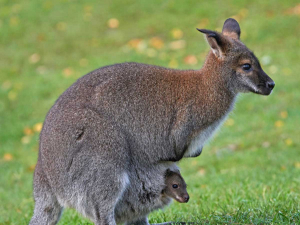Pest confirmed on West Coast
A tropical insect pest with a big appetite for corn has been identified on the West Coast, the first time it has been found in the South Island.
 Biosecurity NZ has launched a new campaign targeting wallabies. Photo Credit: Ministry for Primary Industries.
Biosecurity NZ has launched a new campaign targeting wallabies. Photo Credit: Ministry for Primary Industries.
Wallaby populations continue to grow in New Zealand, something which has prompted the launch of the first national awareness campaign.
The Tipu Mātoro: Wallaby-free Aotearoa is designed to shine a light on the extensive damage wallabies can wreak on the environment, asking Kiwis to report wallaby sightings.
John Walsh, Biosecurity New Zealand’s director of response says wallabies silently prey on the futures of forests and farms.
“We are working in partnership with regional councils, local iwi, farmers and landowners through Tipu Mātoro to manage and reduce populations, but we need everyone’s help.”
Walsh says estimates set the wallaby population at more than one million. However, because the animals are nocturnal and good at hiding, public reports are one of the best ways to manage the spread.
With no natural predators, two introduced species are causing millions in damage each year – the dama wallaby in Rotorua, and the Bennett’s wallaby in Canterbury and North Otago.
“If left unchecked, by 2025 wallabies would cost New Zealanders around $84 million a year in damage and over the next 50 years, they could spread through a third of the country,” Walsh says.
“Wallabies graze on bush undergrowth, and, when moving into an area, can quickly decimate new shoot growth, destroying our native species' habitats and food sources. What were once lush forest understories turn into barren wastelands, meaning that in the coming years our native bush won’t regenerate.
“And their impacts are felt beyond our native bush. They compete with livestock for food, damage fences, foul up pastures preventing it from being a food source, eat planted forest seedlings and contribute to erosion and poor water quality.”
Walsh says the campaign is part of the Tipu Mātoro: Wallaby-free Aotearoa Programme, which focuses first on stopping the spread of wallabies from known areas in the Bay of Plenty/Waikato and in South Canterbury/North Otago.
“By targeting populations outside these containment zones and following up on reported wallaby sightings, the programme can prevent new populations establishing elsewhere in Aotearoa.”
The programme is also undertaking the significant research required to understand wallaby behaviour in a New Zealand context, supporting effective containment and control.
To report a wallaby sighting, head to http://www.reportwallabies.nz/
The Ministry for the Environment (MfE) has found itself in a stoush with NZPork over the controversial National Policy Statement for Highly Productive Land (NPS-HPL).
Fonterra says the sale of its global consumer business and its Oceania and Sri Lankan operations could take 18 months to complete.
The lobby group the Methane Science Accord (MSA) says it welcomes a recent government move to seek outside advice on reducing biological methane targets, rather than relying on recommendations made by the Climate Change Commission.
Well-known scientist Jock Allison has passed away.
After a decade of consultation and court battles, Environment Southland has officially adopted a plan to prevent further decline in the region's water quality.
Farmers are throwing down the gauntlet to politicians - hold an independent inquiry into rural bank lending or face tough questions from the farming sector.

OPINION: Good on the UK'S NFU for battling to get supermarkets to prioritise local farmers' produce.
OPINION: Seven of the UK's major supermarket chains have now responded to the call for them to back the nation's…